|
|
|
Sort Order |
|
|
|
Items / Page
|
|
|
|
|
|
|
| Srl | Item |
| 1 |
ID:
121987
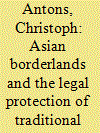

|
|
|
|
|
| Publication |
2013.
|
| Summary/Abstract |
Traditional knowledge related to biodiversity, agriculture, medicine and artistic expressions has recently attracted much interest amongst policy makers, legal academics and social scientists. Several United Nations organizations, such as the World Intellectual Property Organization (WIPO) and the Convention on Biological Diversity under the United Nations Environmental Programme (UNEP), have been working on international models for the protection of such knowledge held by local and indigenous communities. Relevant national, regional or provincial level legislation comes in the form of intellectual property laws and laws related to health, heritage or environmental protection. In practice, however, it has proven difficult to agree on definitions of the subject matter, to delineate local communities and territories holding the knowledge, and to clearly identify the subjects and beneficiaries of the protection. In fact, claims to 'cultural property' and heritage have led to conflicts and tensions between communities, regions and nations. This paper will use Southeast Asian examples and case studies to show the importance of concepts such as Zomia, 'regions of refuge' and mandala as well as 'borderlands' studies to avoid essentialized notions of communities and cultures in order to develop a nuanced understanding of the difficulties for national and international lawmaking in this field. It will also develop a few suggestions on how conflicts and tensions could be avoided or ameliorated.
|
|
|
|
|
|
|
|
|
|
|
|
|
|
|
|
| 2 |
ID:
122430
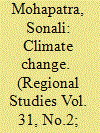

|
|
|
| 3 |
ID:
138904
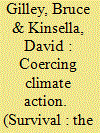

|
|
|
|
|
| Summary/Abstract |
At UN-sponsored climate talks in 2013, the Group of 77 (G77) developing countries, joined by China, walked out briefly in protest against the failure of rich countries to provide a ‘loss-and-damage mechanism’ that would compensate poor countries for the detrimental effects of climate change. At the same conference, Japan’s announcement that it would not meet its emissions goals brought widespread condemnation. These events reflected an intensification of the most persistent deadlock in climate negotiations since the UN Framework Convention on Climate Change (UNFCCC) was agreed in 1992.
|
|
|
|
|
|
|
|
|
|
|
|
|
|
|
|
| 4 |
ID:
097159
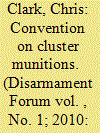

|
|
|
| 5 |
ID:
161271
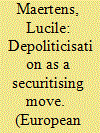

|
|
|
|
|
| Summary/Abstract |
Created in 1972, the United Nations Environment Programme (UNEP) has a normative mandate to promote the protection of the environment at the international level. However, since 1999, the organisation has been conducting field assessments in postconflict situations and addressing the role of natural resources in conflict, framing the environment as a security issue. To do so, the programme insists on its neutrality as a technical and ‘apolitical’ actor within the UN system. Considering depoliticisation as a political act, this article unpacks the concrete practices by which international organisations (IOs) enact depoliticisation. It further argues that IOs can perform securitising moves through practices and techniques presented as outside of the political realm. It draws upon the recent work on depoliticisation at the international level and reinforces studies considering the links between (de)politicisation and securitisation.
|
|
|
|
|
|
|
|
|
|
|
|
|
|
|
|
| 6 |
ID:
112804
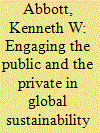

|
|
|
|
|
| Publication |
2012.
|
| Summary/Abstract |
Negotiators preparing for Rio+20 are missing an important opportunity. Private sustainability governance (PSG) is thriving: organizations created by business and civil society groups, as well as public-private partnerships, adopt and apply significant regulatory standards and undertake valuable operational activities, including pilot projects and financing. However, even though reforming the institutional framework for sustainable development is a central part of the Rio+20 agenda, negotiators are focusing almost exclusively on inter-governmental organizations such as the UN Environment Program (UNEP), the Commission for Sustainable Development and the Economic and Social Council. This public-private engagement gap isolates international governance from the energy and innovation of PSG, and impedes efforts to coordinate the bifurcated and decentralized system of sustainability governance. This article argues that states, and especially international organizations, should actively support PSG as part of the institutional framework for sustainable development, while steering private and public-private schemes towards good organizational practices and the pursuit of public goals. Engagement with PSG would help international institutions pursue their sustainability missions more effectively, promote the emergence of effective and legitimate private schemes, manage fragmentation, promote experimentation and learning, and enhance citizen participation. The article outlines two fruitful modes of engagement pioneered by UNEP: regulatory cooperation, in which international authorities engage directly with business firms, industry groups and other 'targets', influencing them to adopt more sustainable behaviors; and orchestration, in which authorities engage with intermediary organizations, such as multi-stakeholder private governance schemes, catalyzing, supporting and steering them as they seek to influence the ultimate targets of policy.
|
|
|
|
|
|
|
|
|
|
|
|
|
|
|
|
| 7 |
ID:
139598
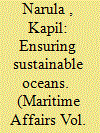

|
|
|
|
|
| Summary/Abstract |
Ensuring sustainable oceans and seas is vital for the well-being of the planet. However, oceans – which are the largest ecosystems – are degrading rapidly, which is a cause of anxiety. The paper presents some of the growing concerns about the health of the oceans and analyses three main drivers of ocean degradation, viz. overexploitation for resources, unintended impacts of anthropogenic activities and weak governance structures. Some of the ongoing work on adopting Sustainable Development Goals (SDGs) for the oceans, and by the Biodiversity Beyond National Jurisdiction (BBNJ) working group for governance of the “high seas”, are then discussed. The paper suggests a way ahead and proposes that India should play a larger role in the ongoing discussions. The paper concludes that there is a need for international cooperation and global support, and ensuring sustainable oceans is the key to sustainable development.
|
|
|
|
|
|
|
|
|
|
|
|
|
|
|
|
| 8 |
ID:
110939
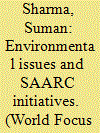

|
|
|
| 9 |
ID:
097155
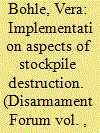

|
|
|
| 10 |
ID:
112805
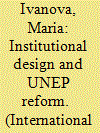

|
|
|
|
|
| Publication |
2012.
|
| Summary/Abstract |
The global environmental governance architecture is set to undergo major reforms, with the main decisions on reform to be taken at the June 2012 Rio+20 UN Conference on Sustainable Development. Discussions on reform have focused on whether the United Nations Environment Programme (UNEP) should retain its institutional status as a subsidiary body of the UN General Assembly, or be transformed into a specialized agency-a World Environment Organization-of the UN. The choice of institutional form, however, cannot be made without reference to both the needs of global environmental governance, and the factors impeding the effectiveness of the current governance architecture. This article takes a historical perspective, highlighting the similarity between the current debate on institutional form, function and financing; and the choices that the original designers of the governance architecture made 40 years ago. The fundamental global environmental problems and the functions of effective global environmental governance, though evolving, have remained largely unchanged. The historical reasons for creating UNEP as it is currently formed thus remain valid today, and provide useful analytical input to the current debate. This article further argues that the reasons for UNEP's shortcomings have little inherent connection to its institutional form, and cannot be resolved simply by a change in status. Deeper, yet probably easier to accomplish, reforms should focus on enabling UNEP to fulfill its intended role as an effective anchor institution for the global environmental governance architecture.
|
|
|
|
|
|
|
|
|
|
|
|
|
|
|
|
| 11 |
ID:
104546
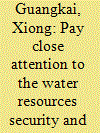

|
|
|
| 12 |
ID:
118243
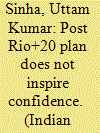

|
|
|
| 13 |
ID:
115314
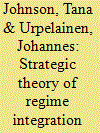

|
|
|
| 14 |
ID:
120951
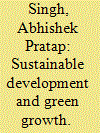

|
|
|
|
|
|
|
|